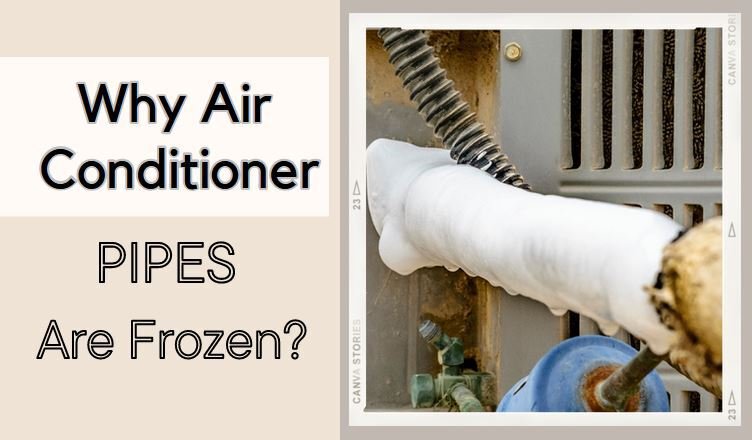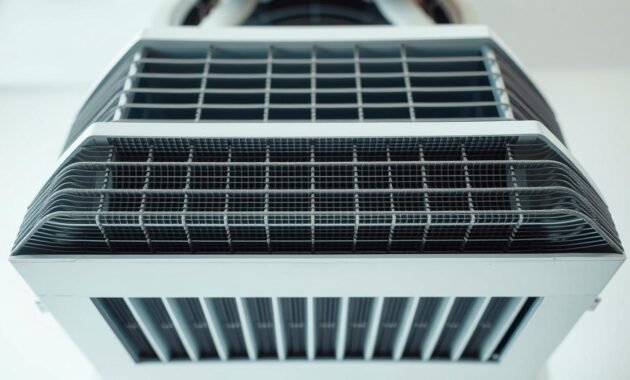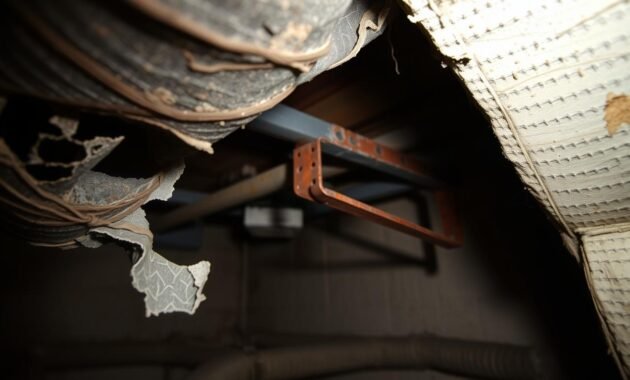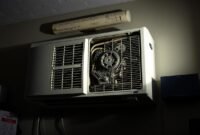Are your air conditioner pipes frozen solid? This problem can turn a cool comfort into a home heating nightmare. Frozen AC pipes disrupt your system’s performance, potentially causing expensive damage if left unchecked. Imagine walking into a sweltering room, expecting relief, but finding your air conditioning system completely unresponsive.
In this guide, I’ll explain everything you need to know about frozen ac pipes. I’ll cover why these pipes freeze and practical solutions to save your cooling system. I’ll help you diagnose and resolve this common air conditioning challenge quickly and effectively.

Understanding Why Air Conditioner Pipes are Frozen
Frozen pipes in your ac system can be really frustrating. Let’s explore why this happens and what causes it.
Air conditioning systems need a balance of temperature and airflow. Warm air enters the system and hits the evaporator coil. This coil works at very cold temperatures, making freezing a big risk.
Read also: Start Freezing As Air Conditioner Heat Mode Not Working?
The Science Behind Freezing
So, why do ac pipes freeze? Several things can cause this problem:
- Restricted airflow across the evaporator coil
- Low refrigerant levels
- Malfunctioning internal components
- External temperature fluctuations
Common Causes of Pipe Freezing
From my experience, pipe freezing often comes from avoidable problems. Dirty air filters, blocked vents, and wrong refrigerant levels can freeze pipes.
Signs Your AC Pipes Are Freezing
Spotting early signs can prevent expensive fixes. Look out for these signs:
- Ice on refrigerant lines
- Less cooling power
- Moisture around the AC unit
- Higher energy use
Knowing these signs can help keep your ac system running smoothly and avoid damage.
Immediate Steps When You Discover Frozen AC Pipes
Seeing a frozen air conditioner pipe outside means you need to act fast. It’s key to catch these signs early to keep your AC running well and avoid expensive fixes.
Here are the first steps to take for frozen air conditioner pipe issues:
- Turn off your air conditioning system completely
- Avoid using heat guns or direct flame to thaw pipes
- Check the air filter for possible blockages
- Inspect nearby areas for water damage
Shutting down your AC is the most important step. Running a system with frozen pipes can really harm it. Let the pipes thaw naturally at room temperature, which usually takes 2-3 hours.
| Action | Purpose | Time Required |
|---|---|---|
| System Shutdown | Prevent mechanical damage | Immediate |
| Natural Defrosting | Allow pipes to return to normal temperature | 2-3 hours |
| Airflow Check | Ensure proper ventilation | 15-30 minutes |
If the pipes keep freezing or you see it happening often, it could mean a bigger problem. In such cases, it’s best to call an HVAC expert to fix your air conditioner’s frozen pipe issue.
How Restricted Airflow Affects Your AC System
Your air conditioning unit needs smooth airflow to work well. When air flow is blocked, big problems can happen. These issues affect how well your cooling system works and how efficient it is.
Blocked airflow causes many problems for your cooling system. These issues go beyond just keeping your home cool. They can also lead to costly repairs if not fixed.
Impact on Evaporator Coils
Blocked airflow harms your air conditioning unit’s evaporator coils. When return vents are blocked, these coils can’t pull in heat right. This can make them freeze and stop working.
- Reduced heat absorption
- Higher risk of coil freezing
- Decreased cooling efficiency
The Role of Return Vents
Return vents are key for good air flow. They pull warm air from inside your home into the cooling system. This air is then cooled and sent back out.
| Return Vent Condition | System Performance |
|---|---|
| Clean and Unobstructed | Optimal Cooling Efficiency |
| Partially Blocked | Reduced Airflow and Performance |
| Completely Blocked | Potential System Shutdown |
Consequences of Poor Air Circulation
Long-term damage can happen if air flow is not good. Your system works harder, uses more energy, and wears out faster. This is because air can’t move freely through vents and ducts.
- Higher energy consumption
- Increased mechanical stress
- Potential premature system failure
Keeping your air conditioning unit in good shape is key. Regular maintenance and making sure return vents are clear are important steps.
Checking and Replacing Dirty Air Filters
Dirty air filters can quietly cause frozen AC pipes. When your AC system has trouble breathing, it can lead to expensive repairs. Let’s explore how to spot and swap out your air filters to keep your AC in top shape.
A clogged air filter blocks airflow to your evaporator coils. This can freeze them and harm your AC system. These filters catch dust, dirt, and allergens, but they need regular care to work right.
- Check your air filter every 30-90 days
- Replace filters in high-traffic or dusty environments more frequently
- Look for visible dirt, dust, or discoloration
When fixing your AC, here’s how to change your air filter:
- Turn off your AC system completely
- Locate the filter compartment (usually near the return air duct)
- Remove the old filter
- Note the size and airflow direction printed on the filter’s frame
- Insert the new filter, matching the directional arrows
- Secure the filter cover
Choosing the right filter is key. Disposable fiberglass filters are cheap, but pleated filters are better for air quality. For homes with pets or allergies, high-efficiency particulate air (HEPA) filters are best. They catch tiny particles and improve air flow.
Read also: Why Dehumidifier Running but Not Collecting Water
The Connection Between Refrigerant Levels and Frozen Pipes
Your air conditioning system needs the right amount of refrigerant to work well. If refrigerant levels are low, it can cause pipes to freeze. I’ll explain how coolant and pipe freezing are linked, a common issue for homeowners.
Refrigerant is key for heat transfer in your AC system. Not enough refrigerant leads to big problems, like frozen pipes. Without enough, the evaporator coil can’t cool properly, causing temperature issues.
Signs of Low Coolant
Spotting low refrigerant early can save your AC system from damage. Look out for these signs:
- Reduced cooling performance
- Ice buildup on refrigerant lines
- Unusual hissing sounds near the AC unit
- Higher energy bills without explanation
Understanding Refrigerant Leaks
Refrigerant leaks need quick, expert help. They can happen for several reasons:
- Damaged refrigerant lines
- Corrosion in the AC system
- Loose connections
- Manufacturing defects
If you think you have a refrigerant leak, call a certified HVAC technician right away. Trying to fix it yourself is risky and could ruin your warranty.
Inspecting Your AC’s Evaporator Coils and Fins

When your air conditioner pipe freezes, the evaporator coils and fins are usually the main culprits. These parts are key to your cooling system’s performance. Let’s go over a simple inspection to spot problems early.
Inspecting your AC’s evaporator coils needs careful steps. First, find the access panel on your indoor unit. Always switch off the power to your AC before you start.
- Look for visible signs of frost or ice buildup
- Check for dust and debris accumulation
- Inspect the fins for any bent or damaged sections
Frozen evaporator coils often show clear signs. Dirty or damaged coils can lower your system’s cooling power. This can lead to bigger issues.
| Inspection Area | What to Look For | Recommended Action |
|---|---|---|
| Coil Surface | Frost or ice buildup | Defrost and check for underlying issues |
| Fins | Dust, debris, or damage | Gentle cleaning with soft brush |
| Overall Condition | Unusual discoloration or corrosion | Professional inspection recommended |
For minor cleaning, you can try it at home. But, if you see big problems, call a pro HVAC tech. They can find out why your AC pipe froze and fix it right.
The Role of the Blower Fan in Preventing Frozen Pipes
Your air conditioning system has key parts to work well. The blower fan is important for keeping air moving. This stops pipes from freezing.
The blower fan keeps the temperature right. It moves air over the evaporator coils. This stops moisture from turning to ice.
Proper Fan Operation Essentials
A good blower fan should have these traits:
- Consistent and steady airflow
- Minimal noise during operation
- Even distribution of cool air across rooms
- No unusual vibrations or grinding sounds
Troubleshooting Fan Issues
Watch for these signs of fan trouble:
- Weak airflow from vents
- Unusual rattling or squealing noises
- Uneven cooling in different rooms
- Higher energy bills without apparent reason
If these problems last, get a pro to check your HVAC. DIY fixes can harm your system.
Regular maintenance is key. It keeps your blower fan working right. This stops pipes from freezing.
Professional AC Repair vs DIY Solutions
Choosing between DIY fixes and professional ac repair can be tough when your AC pipes freeze. Some small problems might be fixed at home. But, bigger issues need a pro’s help.
Before you try to fix your AC, think about how hard it is. Simple tasks like changing air filters or checking airflow are okay for homeowners. But, repairs that involve electrical parts or refrigerant systems need a pro.
- DIY-Friendly AC Maintenance Tasks:
- Replacing air filters
- Cleaning exterior unit
- Checking thermostat settings
- Professional AC Repair Needed For:
- Refrigerant leaks
- Electrical system issues
- Complex mechanical failures
Looking for a good ac repair pro? Check their credentials, read reviews, and make sure they’re licensed. Certified techs can find and fix problems fast. They help avoid damage to your cooling system.
| DIY Approach | Professional Repair |
|---|---|
| Low cost | Comprehensive diagnosis |
| Limited scope of repair | Advanced technical expertise |
| Risk of further damage | Warranty on repairs |
While saving money is key, keeping your AC system safe is more important. If you’re unsure, get a pro ac repair service. They make sure your cooling system works well and lasts long.
Preventing Future AC Pipe Freezing Issues
Keeping your air conditioner pipes from freezing is key to a reliable cooling system. I’ve learned that regular maintenance can avoid expensive repairs and sudden breakdowns.
Frozen air conditioner pipes outside mean your system might be at risk. The American Red Cross suggests several ways to stop pipes from freezing and keep your HVAC in good shape.
Essential Maintenance Strategies
- Regularly check insulation around air conditioner pipes
- Look for any exposed pipes or draft areas outside
- Seal small gaps or cracks near pipe connections
- Keep your indoor temperature steady during extreme weather
Seasonal Preparation Techniques
- Book a professional HVAC check-up before winter
- Use weatherproof insulation on pipes
- Clean around pipes to stop debris buildup
- Test your system’s performance in the shoulder seasons
Using these preventive steps can greatly lower the chance of air conditioner pipes freezing outside. This ensures your cooling system works well all year round.
The Impact of Leaky Air Ducts on AC Performance

Leaky air ducts can really mess up your home’s cooling system. They let cooled air escape before it reaches your rooms. This makes your AC work harder and use more energy.
There are a few signs that might mean you have leaky air ducts:
- Inconsistent temperatures between rooms
- Unexpectedly high energy bills
- Visible dust accumulation around vents
- Whistling or hissing sounds from ductwork
Leaky air ducts do more than just waste energy. They can also let in dust, pollen, and other pollutants. This can make the air in your home unhealthy, which might be bad for people with breathing problems.
Professional HVAC techs can find and fix leaks with special tools. They use things like mastic sealant or metallic tape to fix the ducts. This gets your system working right again.
Fixing leaky air ducts can make your AC cooler and save you money. You could save up to 20% on your energy bills each month. It’s also good to check your ducts often to avoid bigger problems later.
Read also: Why Does My Air Conditioner Keeps Freezing Up?
When to Call an HVAC Professional
Dealing with frozen pipes on your AC unit can be challenging. Some minor AC problems might seem easy to fix, but others need a pro’s touch. I’ve found that knowing when to call an HVAC technician can save you time, money, and prevent damage to your system.
Here are key signs you need a pro for your frozen AC pipes:
- Persistent ice on refrigerant lines even after basic fixes
- Strange noises from the AC unit when it’s running
- The AC shuts down completely or keeps tripping the circuit breaker
- You see refrigerant leaks around the pipes or connections
- Trying to fix the frozen pipes yourself hasn’t worked
HVAC technicians have the tools and knowledge you don’t. They can find and fix the real cause of the frozen pipes, like:
- Refrigerant level problems
- Compressor issues
- Blocked airflow
- Internal system damage
When you book a service, tell the technician all about your AC’s problems. Share what’s been happening, any DIY fixes you’ve tried, and what you’ve noticed about the frozen pipes. This helps them figure out what’s wrong faster.
Don’t try to fix complex problems yourself. Calling a pro can avoid expensive repairs and make sure your AC works right and safely.
Conclusion
Exploring air conditioner pipes freezing has taught me prevention is key. Knowing why pipes freeze can save you a lot of trouble. Checking refrigerant levels and ensuring good airflow are essential steps.
Being proactive with AC maintenance is wise. Regular filter changes, professional checks, and watching for signs can stop problems before they start. Finding the right mix of DIY and professional help is important for a smooth-running system.
Your home’s comfort relies on a working air conditioner. By following our tips, you can avoid AC issues. Quick action and regular upkeep are your best defenses against AC problems.
Understanding your AC system well can lead to better performance and reliability over time. Don’t let frozen pipes surprise you. Stay informed, prepared, and keep your cool.


